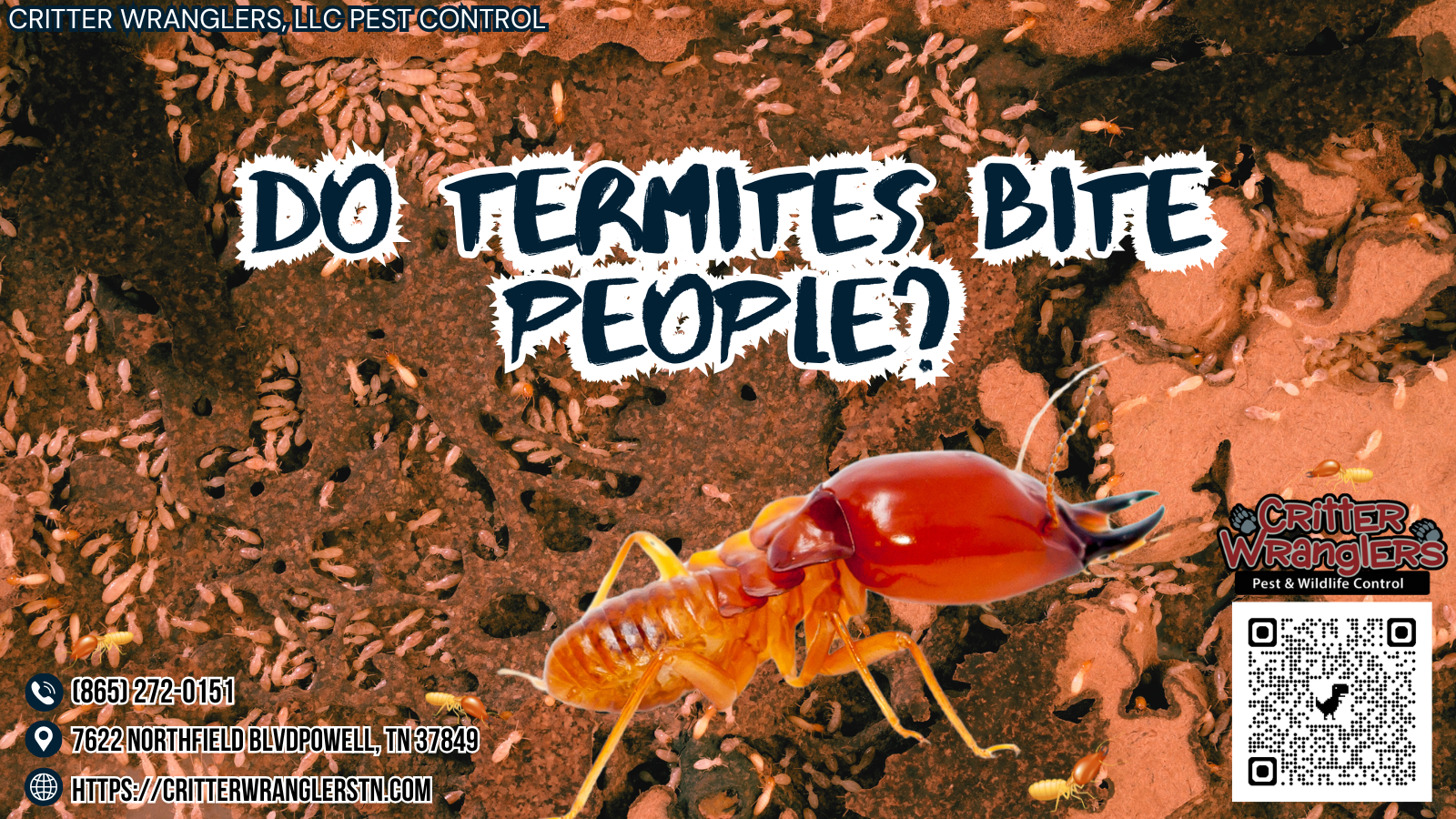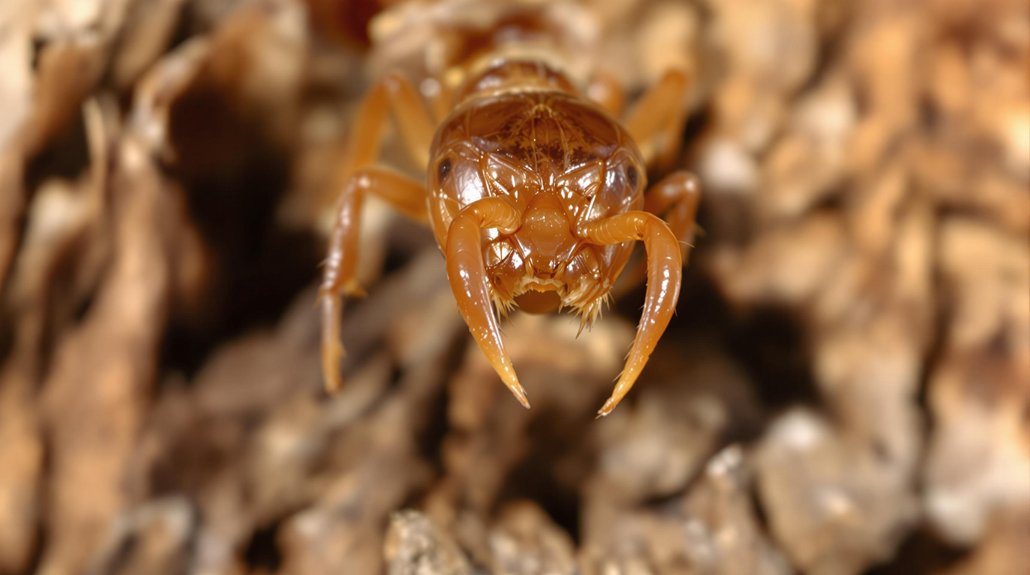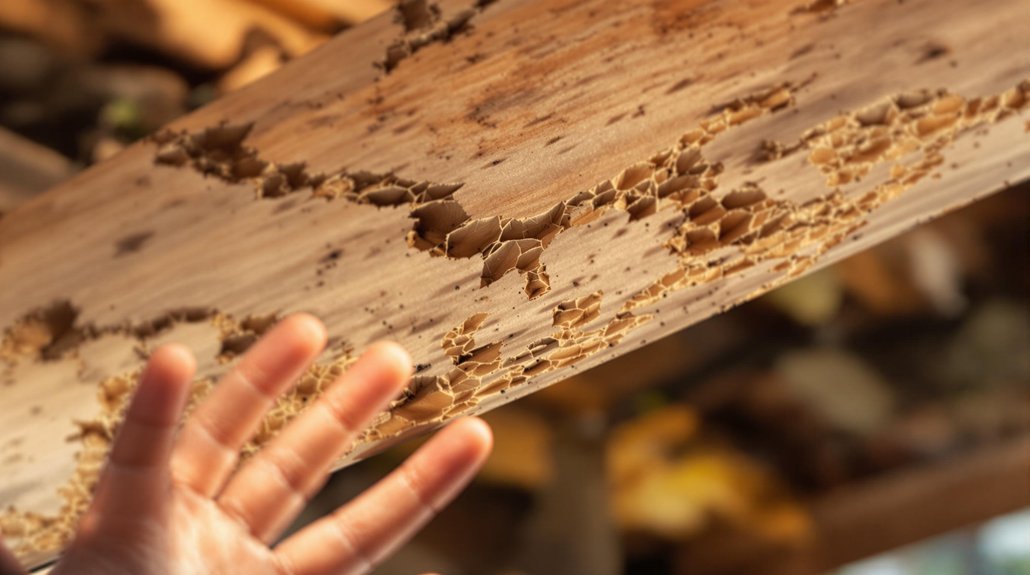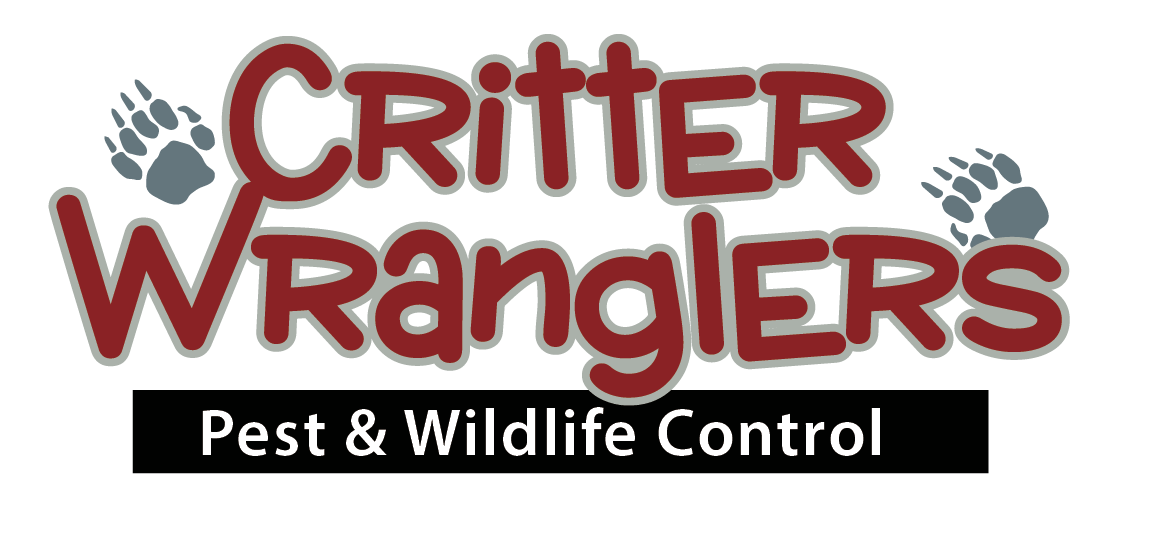Critter Wranglers, LLC Blog
Have an issue? Contact us today

Do Termites Bite People?
Termites generally do not bite people because they prefer wood and plant material over humans. They are social insects that focus on their colony and food sources. Bites may occur if termites feel threatened, but this is rare. When they do bite, it usually causes minor irritation, similar to a mosquito bite. Most people might never experience a bite at all. To learn more about how to prevent infestations and manage termite issues, keep exploring the topic.
Key Article Highlights
- Termites generally avoid human interaction and are not aggressive, making bites rare.
- Biting may occur if termites feel threatened or disturbed during their activities.
- Symptoms of a termite bite include minor irritation, redness, and swelling at the site.
- Termite bites are usually harmless, resembling mosquito bites, with mild discomfort or itching.
- If symptoms worsen, seeking medical advice is recommended for proper evaluation.
Understanding Termite Behavior
Although termites are often misunderstood, their behavior is quite fascinating. These tiny creatures live in large colonies, working together in a unique way. Termite communication is essential for their survival. They use chemicals called pheromones to send messages about food, danger, and even mating. This helps them coordinate tasks and stay safe.
Termite socialization is also interesting. Each termite has a specific role, like workers, soldiers, and queens. Workers gather food and care for the young, while soldiers protect the colony. This teamwork shows how termites rely on each other. Their social structure allows them to thrive in various environments. Understanding termite behavior can help us appreciate their role in nature, although they are often seen as pests.
The Anatomy of Termites
Termites have a unique anatomy that supports their roles within a colony. The basic termite structure includes three main parts: the head, thorax, and abdomen. Each part has specific functions that help the colony thrive. Termites have special body segments and different types of termites, like workers, soldiers, and reproductive members, which all contribute to the colony's success.
Their antennae are long and sensitive, helping them communicate and navigate. The exoskeleton provides protection and support. Overall, termite anatomy is designed for teamwork and survival, allowing them to efficiently break down wood and other plant materials. Understanding this structure highlights the importance of termites in nature and their fascinating way of life.
Do Termites Have Mouthparts for Biting?

While many insects have mouthparts designed for biting, termites possess specialized mouthparts that serve a different purpose. Their unique termite anatomy is tailored for their feeding habits, focusing on consuming wood and plant material rather than biting.
- Termites have strong mandibles for chewing.
- Their mouthparts are shaped to grind cellulose.
- They rely on symbiotic microbes for digestion.
These adaptations help termites efficiently break down tough materials. Instead of biting, they chew and consume wood, turning it into nutrients. This specialized mouthpart design shows how termites thrive in their environment, playing an essential role in the ecosystem. So, while termites might not bite people, their mouthparts are certainly built for a different type of munching!
Instances of Termite Biting
Have people ever wondered if termites can bite? While termites are known for munching on wood, their interactions with humans are quite rare. Generally, termites are not aggressive and prefer to stay away from people. However, in instances where they feel threatened, they may bite. The bite frequency is low, and most people may never experience it. Termite bites are usually harmless, but they can cause minor irritation. It is essential to recognize that termites are more interested in wood than in people. In most cases, they focus on their colonies and the materials around them. So, while a termite bite is possible, it is not something to worry about for most people.
Risk Factors for Termite Bites

What factors might lead to a termite bite? Understanding these risk factors can help in bite prevention. Termites usually don't seek out people, but certain situations can increase the chances of a bite. Here are some key elements to evaluate:
- Infestations: Areas with heavy termite activity may pose a higher risk.
- Nest disturbances: Getting too close to a termite nest can trigger defensive behavior.
- Poor hygiene: Clutter and debris can attract termites, leading to increased encounters.
Conducting a risk assessment of your home can identify hotspots for termite activity. With proper precautions and awareness, people can minimize their chances of getting bitten. Taking simple steps towards bite prevention makes a big difference in keeping those pesky bugs at bay.
Symptoms of a Termite Bite
Termite bites can be surprising and may lead to various symptoms that are important to recognize. When someone gets bitten, they might notice some bite characteristics like redness or swelling at the site. It can feel itchy or uncomfortable, similar to a mosquito bite. In some cases, individuals may experience mild pain or tenderness. Symptom identification is key to understanding if a bite is indeed from a termite. While termites don't often bite humans, knowing the signs can help people react quickly. If symptoms worsen or become severe, it's a good idea to seek medical advice. Overall, being aware of these symptoms can help individuals feel more in control of their environment and health.
Preventing Termites in Your Home
While many homeowners may not think about termites until they see signs of damage, taking preventive measures can save a lot of trouble down the road. Simple home maintenance steps can help keep these pests away.
Termite prevention is key; proactive home maintenance can save you from costly damage later.
Here are a few tips for effective termite prevention:
- Seal cracks and gaps: Check for openings in your home's foundation and seal them up.
- Remove wood-to-soil contact: Keep wooden structures elevated to prevent termites from accessing them easily.
- Maintain proper drainage: Make certain water flows away from your home to avoid damp areas that attract termites.
Dealing With a Termite Infestation
When a homeowner discovers a termite infestation, quick action is essential to minimize damage. First, it's important to identify the signs of termites, like mud tubes or damaged wood. Once spotted, homeowners should focus on termite control. There are various options available, including DIY solutions or commercial products. Infestation management can also involve sealing entry points and removing wood debris around the house. Regular inspections can help catch issues early. Homeowners may choose to use bait systems or liquid treatments to eliminate these pests. Keeping a clean environment is key to prevention. Addressing a termite problem promptly can save money and protect the home. Being proactive allows homeowners to enjoy their space without the stress of unwelcome guests.
When to Seek Professional Help
When it comes to termite problems, knowing when to call for help is important. Signs like mud tubes or damaged wood can mean an infestation is serious. Also, termites can sometimes pose health risks, so getting a professional to check things out can keep everyone safe.
Signs of Infestation
Termite infestations can cause significant damage to homes, so recognizing the signs early is essential. Homeowners should be aware of the common infestation indicators that suggest a problem might be brewing.
- Hollow-sounding wood: When you knock on wooden structures, it should sound solid. If it sounds hollow, termites may be at work.
- Mud tubes: Look for small tunnels made of mud on walls or foundations. These are highways for termites.
- Discarded wings: After swarming, termites leave behind wings. Finding these can mean there's a nest nearby.
If any of these signs appear, it's time to take action. Ignoring these signs can lead to serious termite damage and costly repairs, so seeking professional help is wise.
Health Risks Involved
While termites are primarily known for damaging wood, they can also pose health risks to people living in infested homes. The health implications of termite infestations can range from allergic reactions to respiratory issues due to droppings and debris. Bite prevention is vital, even though termites rarely bite humans. If bites occur, seeking professional help is important.
Here's a quick reference table:
| Signs of Health Risks | Recommended Action | When to Call a Pro |
|---|---|---|
| Allergic reactions | Use antihistamines | Persistent symptoms |
| Respiratory issues | Improve ventilation | Severe breathing problems |
| Skin irritation | Apply soothing cream | If condition worsens |
Staying informed helps protect your health from these pesky critters.
Frequently Asked Questions
Can Termites Transmit Diseases to Humans?
Termites do not transmit diseases to humans. While they can damage wood and structures, they do not pose a direct threat to human health. Their presence is more about property concerns than health risks.
How Can I Tell if Termites Are Present?
To tell if termites are present, look for termite signs like mud tubes, discarded wings, or hollow-sounding wood. These infestation indicators show that termites may be nearby, so staying alert is key for home protection.
What Attracts Termites to a Property?
Termites are like uninvited guests drawn to a party. They are attracted to properties with wood moisture and abundant cellulose sources, such as old trees, wood piles, or even damp walls, seeking a cozy home.
Are There Any Home Remedies for Termites?
Home remedies for termites include natural repellents like vinegar and essential oils. Preventive measures such as sealing cracks and removing wood debris can also help keep termites away. These options offer a simple way to protect homes.
How Long Do Termite Infestations Typically Last?
Termite infestation duration can vary, often lasting several months to years if untreated. Homeowners should explore various treatment options to eliminate termites and prevent further damage to their property, ensuring a safe living environment.
